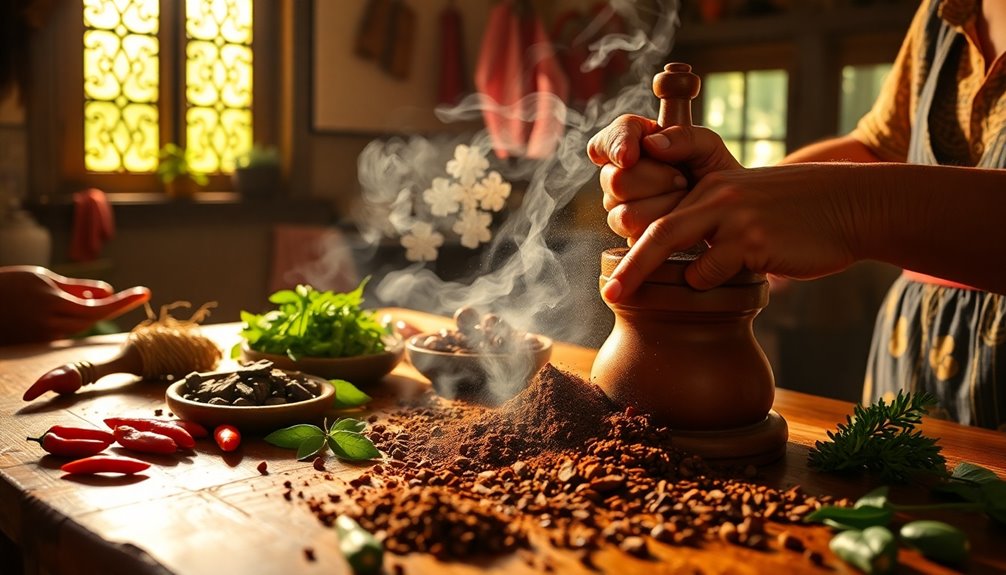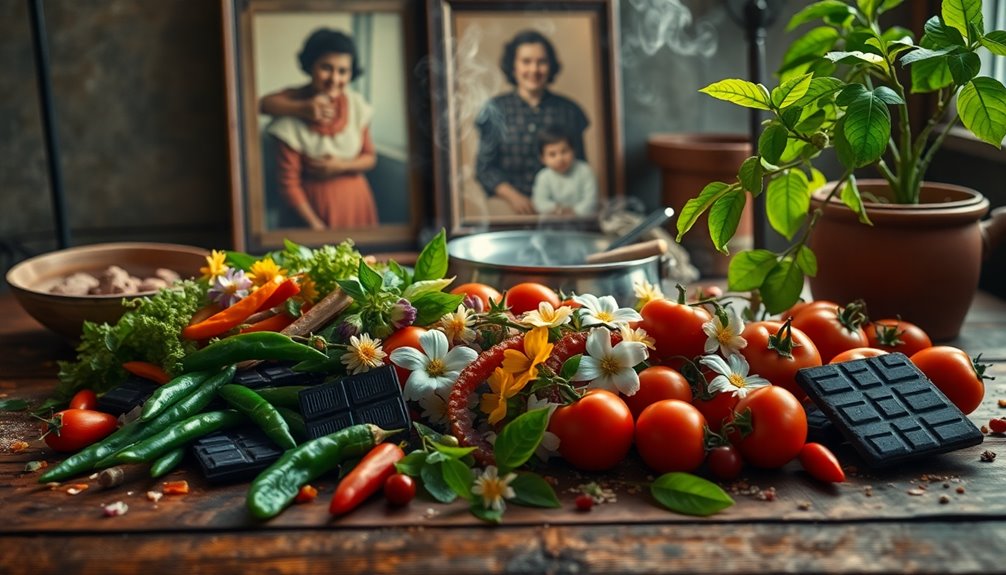In "Like Water for Chocolate," you'll find a rich blend of love, food, and magic that reveals powerful themes. Tita's culinary creations embody her emotions, symbolizing passion and repression. Each dish tells her story, conveying unspoken feelings and cultural identity, while the kitchen becomes a sanctuary for personal growth. The magical realism enhances your understanding of her struggles and transformations, as Tita's cooking affects those around her in extraordinary ways. By exploring these themes and symbols, you'll uncover deeper insights about love's complexity and the importance of emotional expression in shaping one's identity. There's much more to discover.
Themes of Love and Passion

In "Like Water for Chocolate," love and passion simmer at the heart of the narrative, serving as a catalyst for transformation and connection. Tita's culinary creations become the embodiment of her emotions, especially her deep love for Pedro. Each dish she prepares is infused with her feelings, creating a magical realism that envelops those who taste her food. Tita's tears, whether of joy or sorrow, seep into her cooking, evoking powerful reactions that transcend mere sustenance.
Romantic love is a driving force, yet it's intertwined with familial obligations and societal norms. You see Tita struggle against her family's expectations, yearning for autonomy while maneuvering the pain of unfulfilled passion. Her love for Pedro is both beautiful and tragic, illustrating how love can uplift but also wound. In the face of traditional constraints, Tita's journey mirrors the resilience of characters who defy oppressive expectations, much like immigrant communities striving for a better life amidst adversity.
The dimensions of love explored in the novel—from familial bonds to romantic desire—shape Tita's identity, influencing her choices profoundly. Tita's journey of self-discovery and female empowerment reflects the broader themes of challenging societal expectations and embracing personal desires.
Ultimately, the theme of love in "Like Water for Chocolate" reveals its complexity. It brings joy and sorrow, demonstrating how deeply intertwined love and passion are with the essence of life and the act of cooking.
Symbolism of Food and Cooking
Through Tita's journey, food symbolizes her emotions, struggles, and identity. Each dish she prepares reflects her inner feelings, allowing you to see how cooking becomes a powerful means of expression. The novel opens with recipes, intertwining cooking with Tita's narrative and emphasizing its significance in her life and family legacy.
For instance, when Tita's tears fall into the wedding cake, the guests experience profound sorrow, showcasing how her emotions directly influence those who consume her creations. This connection between food and emotion mirrors the transformative power of storytelling that survivors use to navigate difficult experiences. Additionally, the narrative echoes the resilience of women throughout history, highlighting how they often use creativity to assert their identities.
The kitchen stands as a sacred space for Tita, where she connects with her heritage and identity while maneuvering through the oppression she faces within her family.
Family recipes, passed down through generations, highlight the importance of tradition, reinforcing Tita's role in preserving her family's culinary legacy. As she cooks, you witness how food becomes a vehicle for not only nourishment but also for reclaiming her voice and resisting societal constraints. These themes resonate with the stories of resilience and strength of women who face adversities, as shared by successful Australian women in their narratives.
Through the symbolism of food and cooking, Tita's journey illustrates the intricate relationship between her emotions, family ties, and the traditions that shape her identity.
The Role of Magic and Supernatural

Tita's emotional journey intertwines seamlessly with the magical realism that permeates the narrative, where everyday actions take on extraordinary significance. In "Like Water for Chocolate," the magic and supernatural elements serve as a mirror to Tita's emotions, transforming mundane moments into profound experiences.
For instance, her tears imbue her cooking with a supernatural quality, causing anyone who consumes her food to experience heightened feelings and emotional upheavals. This phenomenon mirrors the way food can evoke emotions in various cultures, highlighting the deep connection between culinary practices and human experiences. Additionally, Tita's journey reflects the theme of resilience and determination, as she navigates the challenges imposed by her family and societal expectations.
As you explore the novel, you'll notice how food becomes a powerful medium for communication. Tita's culinary creations act as vessels for her suppressed emotions, allowing her to express what words cannot. Each dish she prepares carries a transformation—her love, sorrow, and frustration seep into the ingredients, manifesting in the reactions of her family and lovers.
This blending of magic with daily life challenges your perceptions of reality, revealing how interconnected emotions and the physical world truly are. The dishes she prepares, reminiscent of culinary innovation, showcase how the act of cooking transcends the ordinary to evoke deep emotional connections.
Ultimately, the supernatural elements illustrate that personal experiences can transcend the ordinary, emphasizing that the power of emotional expression can lead to transformation and connection, making the mundane extraordinary.
Repression and Emotional Expression
While societal and familial expectations often force characters to suppress their emotions, the struggle for emotional expression becomes a central theme in "Like Water for Chocolate." Repression manifests physically, as seen in Tita's experience, where her bottled-up feelings create a sense of emotional turmoil that spills over into her cooking. Tita's tears symbolize this turmoil, possessing supernatural qualities that reveal her intense emotions and frustrations.
Under the oppressive watch of Mama Elena, Tita grapples with the expectations placed upon her, stifling her voice and desires.
Food emerges as Tita's primary means of emotional expression. Each dish she prepares reflects her inner passions, infusing her feelings into the meals she serves. The effects of her cooking are profound, affecting those who consume it, often evoking emotions they can't articulate themselves.
As her repression deepens, the narrative illustrates how unexpressed emotions lead to sickness and despair, contrasting with the liberation found through honest expression. In this way, the story emphasizes that true freedom comes from embracing one's feelings, suggesting that emotional expression isn't just a personal journey, but a path to collective healing. The importance of emotional connections in fostering personal growth resonates similarly in classic tales like "The Secret Garden."
Cultural Identity and Tradition

In "Like Water for Chocolate," food serves not just as a means of emotional expression but also as a profound connection to cultural identity and tradition. Tita's culinary skills embody the rich heritage of Mexican culture, showcasing how cooking becomes a crucial link to her family's legacy.
The narrative underscores the importance of family recipes passed down through generations, emphasizing how these traditions preserve cultural identity.
As Tita grapples with the oppressive tradition that restricts her from marrying, her struggle reflects broader societal constraints on individual desires and cultural norms. The novel critiques harmful traditions, showing how they can stifle personal freedom, yet it simultaneously celebrates the enduring legacy of cooking. For Tita, food becomes a means to assert her identity and channel her emotions.
Cultural identity is intricately tied to the acts of cooking and sharing meals, illustrating how these practices strengthen relationships and communal bonds within the De la Garza family. Each dish she prepares tells a story, connecting past and present, and allowing her to express herself in a world that often tries to silence her.
In this way, Tita's kitchen transforms into a sanctuary of tradition and empowerment.
Conclusion
In "Like Water for Chocolate," you see how love and food intertwine, revealing deep emotional connections. Did you know that over 60% of readers say they feel more connected to their culture through food? This statistic shows the power of culinary traditions in shaping identity. As you explore the themes of magic and repression, you can appreciate how Laura Esquivel's story captures the essence of human experience, blending passion and culture in a truly enchanting way.




